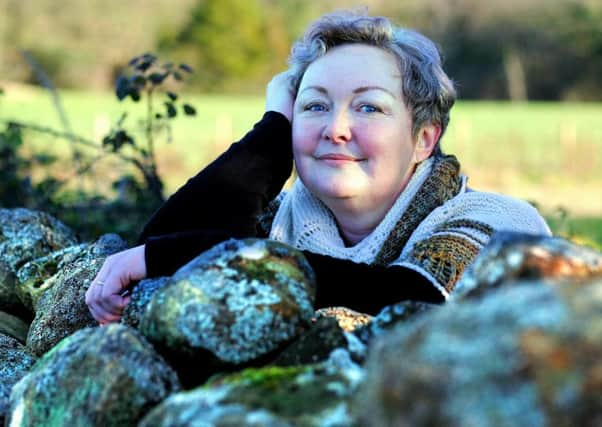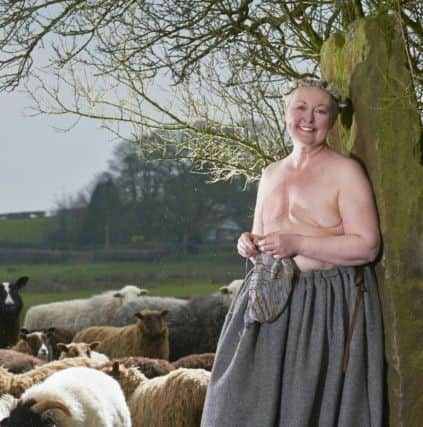Using creativity to deal with cancer journey


Being a creative person, Susan Crawford found vocalising her experience and sharing her journey a real boost when she was diagnosed and treated for breast cancer.
Susan shared pictures of herself at all stages of her treatment on social media and discussed her reasons for deciding to have a double mastectomy.
Advertisement
Hide AdAdvertisement
Hide AdSusan found the counselling she received at the charity CancerCare hugely beneficial and now wants to give something back by fundraising through her creative creations.


Susan, who lives and works at an idyllic farm at Halton near Lancaster, is a knitwear designer, writer and entrepreneur.
When Susan discovered she had breast cancer it came as a massive shock and her creativity was affected and the development of her business was held back for a time.
However, she has now made it through her treatment and with some additional support from CancerCare in Lancaster, Susan and her international knitwear design and publishing business are thriving again.
Advertisement
Hide AdAdvertisement
Hide AdSusan, who lives at Monkley Ghyll Farm with her husband Gavin, was deeply distressed to find she had breast cancer in 2016. She had been feeling tired but had put it down to stress and over-work.


Susan recalls: “I could not believe it. It was stage three breast cancer. I was told I had a 69mm tumour in my right breast. The cancer was also in my lymph nodes.
“I was told I would need to have chemotherapy, followed by a mastectomy, radiotherapy and a year-long course of Herceptin. It was mind-blowing.
“The words ‘chemotherapy’ and ‘cancer’ were terrifying to me but the speed of treatment commencing didn’t give me time to dwell.
Advertisement
Hide AdAdvertisement
Hide Ad“Within a couple of weeks from diagnosis I began chemotherapy at Lancaster Oncology Unit.
“My body reacted quite strongly to the chemo but it did its job, shrinking the tumour and killing off the cancer in the lymph nodes.
“They still did a full lymph node clearance. My cancer wasn’t hormone driven, which actually I’m happy about because I didn’t want to have to spend years on medication.
“I did suffer with ‘chemo brain’ - cognitive dysfunction due to the chemotherapy. It was a struggle to recall things.
Advertisement
Hide AdAdvertisement
Hide Ad“As someone who runs her own business, not being able to think straight was extremely frustrating.
“I felt as if part of me had been taken away. I did brain training exercises and quizzes to keep my brain active but it is only in the last few weeks that I have felt back to myself again.”
Susan heard about CancerCare shortly after her first chemotherapy session and self-referred.
She says: “Andrea Partridge who leads the Phoenix breast cancer support group at Cancer Care sat me down on the sofa at CancerCare’s centre and we chatted.
Advertisement
Hide AdAdvertisement
Hide Ad“I had been worrying that I wasn’t going to get better. I told Andrea about my diagnosis and she’d had the same diagnosis as me - but here she was, several years on, looking amazing and healthy.
“It just gave me such a lift to see someone who had come through it.
“Andrea told me about the services that were available at CancerCare and how I could continue to access the services even after my treatment was completed.
“I therefore decided not to have counselling until it was all over so I could then make sense of what I had gone through.
Advertisement
Hide AdAdvertisement
Hide Ad“I was focused on getting through the treatment. While I was going through treatment, it was the Phoenix Group that I used the most; having that online group to ask ‘has anybody experienced this?’
“So many of us go through similar things and have the same worries. I didn’t feel isolated thanks to the Phoenix Group.
“Just knowing you’re not alone is amazing. It also gave me the strength to support other people.
“I need to be able to vocalise how I am feeling so it was great to have that group to talk to and to ask questions.”
Advertisement
Hide AdAdvertisement
Hide AdSusan also found it helpful to document her progress using social media. She shared a lot of her journey on Instagram. She explains: “I was already using it for my business, so it was natural to me to share my story on there.
“I’m a creative person and it helped me not to stagnate.
“I shared pictures of myself at all stages and talked about what I was going through. I’ve had so many wonderful comments from people who found it helpful.
“I shared why I decided to have a double mastectomy. Lots of people are scared of using the word ‘mastectomy’.
“It’s partly the fact that you have changed. Some people feel scared to leave the house and hide away.
Advertisement
Hide AdAdvertisement
Hide Ad“For a woman, it’s partly how the cancer attacks you. You lose your breasts, your hair, your eyelashes – you lose things that make you feel like a woman.
“I opted to have a double mastectomy because I wanted to move on and I didn’t want to have any more operations.
“If I’d kept just one breast it would have felt awkward. Asymmetry can damage your posture and all sorts of things. For me as well as being reassuring, it seemed common sense to have the double mastectomy.
“At the hospital it was assumed that I would want to have reconstruction but I think women should be fully informed of all the options so they can make the best possible choice.
Advertisement
Hide AdAdvertisement
Hide Ad“Many women strive to be the way they were but I believe if you can accept the new reality, it’s much better.
“I have been relatively positive in coming to terms with the changes but I have had dark days.”
Susan says the counselling she recently received at CancerCare was extremely helpful. She says: “It has helped me to make sense of what it going on in my head.
“You can have the bleakest and darkest thoughts and that’s okay. Then you have just got to process it and learn how to deal with it.
Advertisement
Hide AdAdvertisement
Hide Ad“The NHS doesn’t have that after-care facility. It’s hugely beneficial to be able to talk.
“Cancer is a physical disease but it does things to you in so many other ways. It can bring things up that you have ignored for a long time.
“Your confidence levels can plummet when that is taken away.
“Women’s clothing is all geared to having breasts. I think the next positive move for clothing companies and the media would be to represent women who have had mastectomies – not to shy away from it.”
Advertisement
Hide AdAdvertisement
Hide AdA positive project that helped Susan and some of her friends in the Phoenix Group cope with cancer was the ‘Knocker Jotter’.
This was the brainchild of Andrea and Sarah from the Phoenix Group who had the idea of making and selling a book featuring images and quotes from some of the group members known as ‘The Scarletts’.
Susan offered her farm as the venue for the photoshoots and the result is an inspirational book that can be used as a journal or notebook.
The Knocker Jotter is now on sale at CancerCare and on the charity’s website.
Advertisement
Hide AdAdvertisement
Hide AdSusan says: “It was a good way for me to slowly start getting involved in work again.
“My daughter Charlie, who is a stage manager for the Legends show in Blackpool, helped to organise three days of photoshoots.
“Gavin, my husband, is a graphic artist and he offered to do the design and layout of the book.
“Having the photos done felt natural and right. I think it’s a beautiful picture of me.
Advertisement
Hide AdAdvertisement
Hide Ad“It was an amazing few days. It was so positive. Everybody gained from it. Some people were scared at first but they all felt better for the experience.”
Susan has created a beautiful shawl pattern in four colours inspired by The Scarletts in the Knocker Jotter.
Susan says: “The wool is from the ‘Lonk’ – the only truly indigenous Lancashire sheep – it has been here since the 13th Century.
“The wool is produced from our own sheep and from another farm in the Lune Valley.
Advertisement
Hide AdAdvertisement
Hide Ad“I am selling the shawl pattern and wool as a kit in a lovely hand-made bag accompanied by a copy of the Knocker Jotter. £15 from each kit sold is then being donated to CancerCare.
“I’ve already sold kits all over the world and I hope this will help to raise awareness of issues surrounding breast cancer.”
Susan is particularly excited about her most recent book – The Vintage Shetland Project – which she was working on when she became ill.
It features knitting patterns, photographs and stories about the vintage knitwear collection from the Shetland Museum.
Advertisement
Hide AdAdvertisement
Hide AdSusan says: “By completing the Vintage Shetland Project, I feel that I am finally putting my illness to bed.”
• For more information on Susan’s work, visit: www.susancrawfordvintage.com. You can buy Susan’s fundraising shawl kit including a copy of the Knocker Jotter at: www.susancrawfordvintage.com/product/fubc-shawl-kit/
Follow her photographic journey on instagram.com/susancrawfordvintage
The Knocker Jotter is available from CancerCare’s online shop at www.cancercare.org.uk